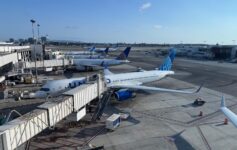Nicholas Kralev’s mistake fare column was superior because it featured yours truly, but Scott McCartney’s latest column on mistake fares is well done.
I particularly liked this:
UAL Corp.’s United Airlines, Continental Airlines Inc., Southwest Airlines Co., JetBlue AirwaysCorp. and Singapore Airlines all say their policy is to not cancel tickets even when a mistake is discovered, no matter how large the error.
"That is the right thing to do," says United spokeswoman Robin Urbanski. In 2007, United honored a business-class fare from Los Angeles or San Francisco to destinations in New Zealand that was missing one zero: it was sold as $1,062 plus taxes and fees instead of $10,620 plus taxes and fees.
Way to go Robin–I’ll be holding you to this statement! I respect that attitude. When an airline processes your credit card and issues you a ticket complete with ticket and confirmation numbers, a contract has been formed and should not be unilaterally voidable because one side does not like the terms.
Compare this to Delta’s policy:
Delta Air Lines Inc. states in its contract of carriage, the legal rules printed on tickets, that for erroneous fares it "reserves the right to cancel the ticket purchase and refund all amounts paid by the purchaser or, at the purchaser’s option, to reissue the ticket for the correct fare."
I hate this vague policy. What’s to stop to Delta from canceling leisure tickets at the gate in an oversell situation because they were "erroneous?" Without a clear standard of what constitutes and erroneous fare, I think Delta reserves the unlawful right to void a contract.
One solution to mistake fares may be giving airlines the same 24-hour grace period customers are given to cancel a ticket without penalty. Still, such a solution is fraught with peril. What if it’s a refundable ticket or a ticket for same day travel?
Bottom line, I think airlines need to suck it up if they file a fare that in hindsight was a mistake. But having dealt with lawyers from multiple airlines, I can tell you that if a mistake fare will require a tremendous out-of-pocket expenditure, airlines would much rather fight individual cases in court than honor the fare. Everything is a cost-benefit analysis.
An obstacle for flyers like me who love "sale" fares is the way the DOT resolved the recent British Airways $500 India fare dispute.
In a letter to customers who complained, the DOT said it believed airlines should accept "some responsibility" for erroneous fares and should make customers "whole" when tickets are rescinded.
In contract law, there are three types of interests: reliance, restitutionary, and expectation.
In the case of honoring rescinded airline fares, most passengers seek expectation damages–putting the injured party in the position as if the contract had been performed. In resolving the issue in the manner it did, the DOT has created a precedent making airline responsible only for reliance damages. In other words, an airline is only responsible for putting the injured party in the same dollar position as if the contract had never been formed.
What that means for us is that airlines now essentially have a government-approved escape hatch to wiggle out of any fares they deem "erroneous," as long as they refund the ticket price and any related expenses attributed to the purchase of that airline ticket, such as non-refundable hotel rooms.
It was that guidance that moved American Airlines to swiftly cancel a $1200 First Class fare to Australia on their codeshare partner Qantas.
Count on similar outcomes in future fare disputes, especially if U.S. airlines are involved.
Hey Scott: next time you do a column on mistake fares, give me a holler. I’ve been a part of every major mistake fare the last four years!




United looking out for customers, and not hiding behind some prolix corporate drivel statement defending rescinding mistake fares. Count me incredulous.
What about in a situation where, after the person is “made whole,” the price to buy even the cheapest ticket is above the refunded amount?
For example, today I buy a mistake fare for a trip I NEED to take in 3 weeks for $100 on Airline X. Two weeks later Airline X discovers the mistake and refunds me the $100. However, by now with only 1 week left before my departure, fares have shot up to $500. Does this still count as “making me whole?” Or would Airline X be responsible for the difference?
@gluedtothewindow: An excellent point and why the concept of reliance damages is unappealing in this context.
For the FAA, being “made whole” only means restoring you to a position as if the transaction never took place. That doesn’t sound like being made whole to me, but that’s the FAA ruling.
Quite different than the Canadian Transportation Agency (CTA), which has been enormously helpful in past fare mistakes booked on Canadian websites.
The sad news is, according to McCartney’s column, that even when people do sue, some courts are siding with the airlines. I can’t justify how a court sitting in law or equity could side with an airline on the grounds that the customer should have known that the cheap fare was too good to be true.
Have they looked at the base fares of RyanAir or even Lufty (for example) on intra-Europe flights?
The irony of this post is that I missed a $250r/t AA DCA-SAN First Class mistake fare while I was typing it…
Thanks for the reply Matthew. If it’s any consolation, your “first class experience” would have been on a combination of Eagle RJs and 737/757s.